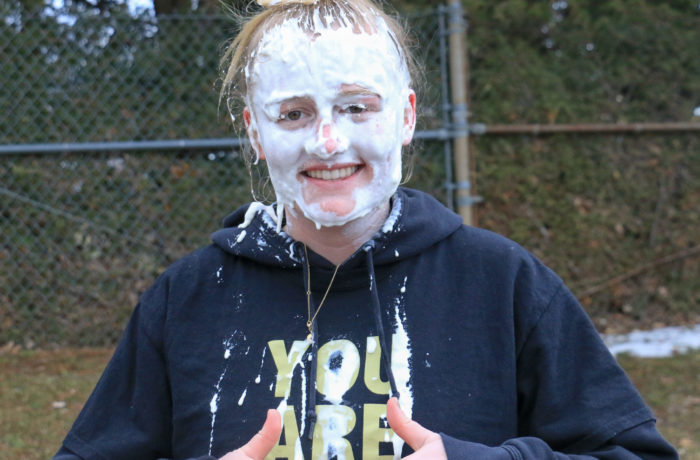By Katherine Martin
Politics Editor
As the country watches supreme court justice nominee Brett Kavanaugh and his denial of sexually assaulting a woman when he was in high school, new policies surrounding sexual assault are being prepared.
These new policies for sexual assault and harassment on college campuses have students like Sandra Brown* ’19 worried. Brown was a sophomore when she was sexually assaulted by a male student who walked her home from Oh Shaw’s, a bar next to campus.
“I barely knew him but I said yes anyways,” said Brown. “When we got back he wouldn’t take no for an answer.”
“I felt like I put myself in the position to be alone with him. I told myself I was drunk and that I led him on. Looking back, I know that’s not what happened.”
U.S. Secretary of Education Betsy DeVos is proposing new policies for universities surrounding sexual misconduct. If passed, they would strengthen the rights of the student accused of assault, harassment, or rape by restricting the definition of sexual assault. These policies would also minimize institutions’ responsibility to investigate, holding schools accountable only for incidents on campus and formal complaints filed through proper authorities, such as Public Safety.
Brown is among many college students who choose not to report cases to authority.

The shame factor
“I didn’t go forward because I had questioned myself,” said Brown. “I regret not going to administration because at the time I was just afraid. If we all went forward, it would help make it known how often this happens. With these new policies, no one is going to come forward.”
One in five students will be victim to some sort of sexual misconduct, harassment, or rape during their collegiate years, according to the Department of Justice. St. Michael’s is no exception. During the 2016-2017 academic year, five students reported being sexually assaulted here. In that same year, 13 students filed misconduct reports to Hope Works, the local hotline for sexual misconduct. Misconduct might include rape, attempted rape, sexual assault, sexual harassment, stalking or sex trafficking.
“Before I came to college I didn’t believe sexual violence really happened. Now, I can list more than 10 people, not including myself, that I know it has happened to,” said Brown.
Brown said she worries that DeVos’s new policies would only emphasize victim-blaming, an act where the victim of a crime is held responsible for the misconduct they suffered.
“It’s such a stigma” Brown emphasized, “I blamed myself for a really long time. And we all know the girls who have gone forward. A lot of slut shaming came with the case that we heard about [at St. Michael’s] where the girl won and the guy left campus.”
“That’s more traumatic. I don’t want to be the next campus gossip.” Brown and other students worry that DeVos’s policies will only add additional barriers for victims attempting to seek support. The proposed changes will allow the right for the accused student to cross-examine the victim in a campus setting.
Prevention trumps policies
But some advocates for victims say that while the policies about repercussions are important, prevention is more critical. New rules may turn victims away from seeking legal aid but, Cathleen Baker, executive director at Hope Works in Burlington said she believes prevention is where the most work needs to be done.
“I think our error has been that we focus all of our attention on the response and little towards prevention,” said Baker. “We need to talk about sex and consent. I’m all about education often and early. We are trying to do some serious catch up.”
Catherine Welch, assistant dean of students and Title IX coordinator at the college has similar goals with her plans to start a nonprofit on campus surrounding sexual misconduct.
“I think there are conversations we aren’t having and need to be having in a way that college students feel comfortable,” Welch said. “If students could be the leaders in having those conversations in small groups, our community could come to an understanding of what consent means, what healthy relationships look like, and how they are, as students, taking the lead to foster that.”
“Students can have that conversation in a way that staff and faculty cannot,” Welch said.
“It’s the same for mental health and the student support network with Hope Happens Here. Students often know friends are struggling before employees do so, how can we equip students to have this conversation?”
Since the birth of Hope Happens Here, a non-profit on campus whose goal is to end the stigma around mental health in athletes, the conversation on campus around mental health has become more normalized. Student athletes suffering from mental health issues are continuing to use the organization as an outlet to share their stories which in turn, is helping end the stigma.
“I feel easier admitting I have depression and anxiety than I would talking about this,” said Brown. That same support system for mental health is lacking on campus for students suffering trauma from sexual assault. Despite high numbers of sexual misconduct taking place on college campuses, conversations about it are yet to be normalized.
While it’s unclear when and if DeVos’s policies will be made law, Welch is encouraging students to focus their attention on prevention. She believes that opening the dialogue amongst friend groups is the best way to keep students, both male and female, aware of when there is consent, when to say no, and when to recognize an unhealthy situation.
“It’s such a dehumanizing experience,” said Brown. “It shouldn’t be this common.”
*Sandra Brown, not her real name, changed for confidentiality.
Resources
If it happens to you…
• Public Safety – 802.654.2911
• Bergeron Wellness Center – 802.654.2234
• HOPE Works – 802.863.1236
• Campus Ministry – 802.654.233
• Catherine Welch – 802.654.2271


